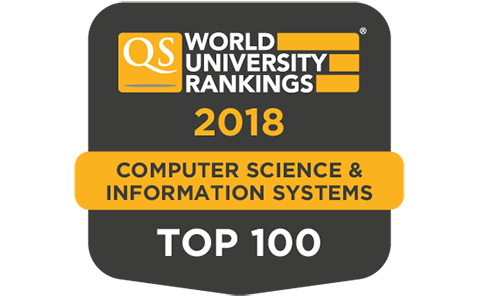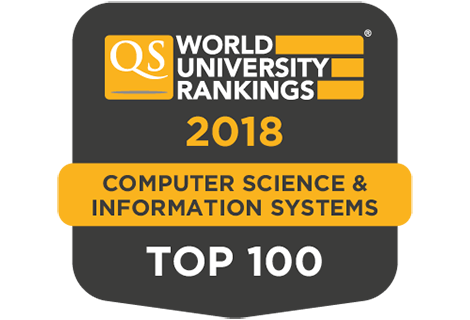
QS World University Rankings
We are in the top 100 in the world, and the top 10 in the UK, for Electrical and Electronic Engineering

We are in the top 100 in the world, and the top 10 in the UK, for Electrical and Electronic Engineering

We are in the top 100 in the world, and the top 10 in the UK, for Computer Science

The University of Southampton is leading a consortium of industry pioneers to launch a 5G testbed for urban scale trials of next generation internet services across European cities.
The consortium, known as the FLAME project, will test 5G technology with consumers for the first time in a real-life environment, with 100s of people taking part in trials throughout 2018. 5G is expected to transform next generation networks by providing faster access to media and new services such as augmented reality.
FLAME will initially launch in the smart-cities of Bristol and Barcelona, with plans to expand to further locations across Europe over the course of the projectâs three-year lifespan. The programme will allow players from creative industries, telecommunications industries and smart cities to run 5G trials on an urban scale that improve experience for consumers, reduce the complexity of media service development and reduce the cost of delivering personalised on-demand content.
The projectâs coordinator Michael Boniface, Technical Director at the IT Innovation Centre (an applied research centre within Southampton's department of Electronics and Computer Science), said: âFLAMEâs urban scale 5G testbeds provide unique opportunities to explore the acceptance, viability and performance of 5G networks. By focusing on media services the benefits of 5G can be experienced by consumers whether they are having fun, learning or just exploring the world.
âSuccess depends on establishing transformative media ecosystems that benefit everyone from consumers and content providers through to the operators of communications, transport and building infrastructures. The launch of FLAMEâs testbed for urban scale trials is a major milestone in the evolution and adoption of 5G.â?
At the heart of FLAME is a ground-breaking service delivery platform that uses software-defined infrastructures being rolled out across smart-cities. The platformâs advanced networking and service management capabilities allows media services to be dynamically placed and connected in locations where consumersâ need them.
Dirk Trossen, FLAMEâs Technical Manager and Senior Principal Engineer at InterDigital Europe, said: âFLAMEâs unique technologies set this test bed apart from previous efforts. It will provide first insights into the possible transformation of media services through deep integration with the programmable compute and networking infrastructure at city scale.â?
âThe strong combination of development, deployment and exploitation through standards as well as consumer-facing trials allows for building a strong European competence in main 5G technology areas from software-defined networking over network function virtualization to flexible service routing over such programmable Layer 2 transport networks.â?
The initial trials, starting next month, focus on new media production and delivery workflows enhancing audience generated content for broadcasters, augmented reality gaming, personalised augmented reality city tours, and personalised access to mobile media.
FLAMEâs Engagement Manager, Monique Calisti, Executive Director and Partner at Martel Innovate, said âWith funding available for third parties to pursue experiments on the FLAME platform, our ambition is to create an exciting, creative and vibrant future media internet ecosystem. Through the FLAMEâs open calls European innovators will be given the unique opportunity to conduct experiments in real-life experimental infrastructures and gain insight into the performance, acceptance and viability of their solutions.â?
The University of Southampton is leading a consortium of 12 partners across six countries to launch FLAME as part of Horizon 2020, the largest ever European funding programme for research and innovation.
The partners include:
For further details, contact Michael Boniface H2020 FLAME Project
Researchers from Electronics and Computer Science (ECS) at the University of Southampton will use bio-inspired algorithms and machine learning to develop fault-tolerant robotic swarms in a new scheme funded by the Engineering and Physical Sciences Research Council (EPSRC).
Assistant Professor Dr Danesh Tarapore from ECSâs Agents, Interaction and Complexity research group will lead the New Investigator Award project that will create groups that can rapidly detect faults and adapt to environmental changes, paving the way for real-world applications such as the monitoring of pollutants in large bodies of water.
Through close collaboration with project partners, the research will lead to the next generation of robot swarms, capable of sustained operation for extended periods of time without human intervention.
âRobots are increasingly becoming an important part of our day-to-day lives, automating tasks like keeping our homes clean and packing parcels at large warehouses,â? Danesh explains. âOur aging population and the need to substitute human workers in dangerous and repetitive tasks mean that new tasks are emerging on the horizon, such as automation in agriculture and environmental monitoring. This will require robots to do more and work in large-numbers as part of a swarm, acting over vast areas and efficiently performing their mission.
âHowever, robot swarms to date are not prepared for deployment; unable to deal with the inevitable damages and faults sustained during operation, they remain frail systems that cease functioning in difficult conditions. The goal of this project is to remedy this situation by developing algorithms for robot swarms to rapidly - in no more than a few minutes - recover from faults and damages sustained by robots of the swarm.â?
Existing fault-tolerant systems for robot swarms can only diagnose issues anticipated in advance by the designer. Danesh proposes robotics move beyond these traditional approaches as it is not possible to predict all the scenarios a swarm may encounter while operating in complex environments for extended periods of time. His new project, titled âRapid fault-recovery strategies for resilient robot swarmsâ, will lay the foundations for future robotics through the development of data-efficient machine-learning and nature-inspired computing algorithms.
The new approach will enable robots to adapt their behaviour to sustained faults within the swarm by learning through trial-and-error new compensatory movements that work despite the faults. The resulting system of working swarm behaviours would open up new applications for long-term deployment, with Danesh already planning a swarm of autonomous surface vehicles that can monitor large bodies of water for pollutants.
EPSRCâs New Investigator Award is a new scheme that supports researchers who have recently entered their first academic lectureship position. Danesh becomes the first researcher in Southamptonâs Faculty of Physical Sciences and Engineering to receive the award, which will provide £250,000 over the next two and a half years, and will collaborate with the Southampton Marine and Maritime Institute as well as project partners ASV Global, MBDA UK Ltd and INRIA Lorraine.
At Southampton, aspiring entrepreneurs will have the chance to develop the professional enterprise skills needed to make their mark on the world.
Discover how we can help your business dreams.Three postgraduate research students from the University of Southampton have been presented Excelling Student awards at The Royal Embassy of Saudi Arabia.
Computer scientists Dr Abdulrahman Ayad Alharthi, Madini O Alassafi and Dr Alaa Abdullah AlMarshedi received the honours from HRH Prince Mohammed bin Nawaf Al Saud this winter, recognising the importance of their PhD research in the Department of Electronics and Computer Science (ECS).
The students were among just 30 people selected from across the UK for the prize, which is celebrated annually at The Royal Embassy in Charles Street, London. The awards recognise research and study distinction as well as scientific innovation and excellence, with recipients receiving a royal invitation to a lunch event which includes an honorary shield, certificate and financial reward.
Abdulrahman and Madini have centred their PhDs on cloud computing in migration and adoption projects, while Alaa Abdullah focused on gamification for the self-management of chronic-illnesses. The three students have been working with supervisor Dr Gary Wills from the Cyber Physical Systems research group and Abdulrahman and Alaa Abdullah have both recently completed their studies.
âItâs an honour to have been selected for such a prestigious prize,â? Abdulrahman says. âI am proud to have demonstrated the high quality of ECS students at Southampton both to The Royal Embassy and other represented universities.â?
Artificial intelligence expert Dr Sarvapali (Gopal) Ramchurn has been awarded a grant from the AXA Research Fund, becoming only the second UK-based academic to ever be supported by the initiative in the field of Responsible Artificial Intelligence.
The AXA Research Fund, the philanthropic initiative of the AXA Group, is dedicated to boosting scientific discoveries that contribute to societal progress and will provide him with â¬250,000 to further investigate how AI can be responsible and accountable.
The award recognises the Associate Professorâs innovative contributions to his field, which includes over a decadeâs work at the University of Southamptonâs renowned Department of Electronics and Computer Science (ECS).
âWe are at a critical point in time where key questions are being asked about how AI will change peopleâs lives for better or worse,â? Sarvapali says. âItâs an honour to have been granted this award, and it reflects how the research in our Agents, Interaction and Complexity group is truly world-leading. It is recognition of not just my work but also the current and past colleagues, researchers and students that Iâve been fortunate to work with.â?
Sarvapaliâs research has largely centred on the development of intelligent software and robotic agents, with a focus on how such agents are designed to work alongside humans and other agents. He is also a board member of ECSâ new Centre for Machine Intelligence, which aims to develop a coherent approach to research and technology transfer in the areas of artificial intelligence, machine learning, and autonomous systems. His next steps will focus on the design of interactions with AI that ensures that humans have reasonable expectations about the behaviour of intelligent agents and supports rather than hinders their daily activities.
âMy goal is to develop some of the underpinning technology that will ensure AI remains safe and responsible,â? Sarvapali explains. âSome of the targets will be to look at how we can design AI systems to cope with varying degrees of user understanding and how we can design interactions with AI to make sure that control is given to users when it most matters, while the complexity of decision making is dealt with by the AI when the user does not need to be involved. We will also be establishing new methodologies derived from a user-centred approach to the design of AI. A key part of the work will also involve tracking the provenance of AI and human decision making to ensure that systems are accountable.â?
Researchers from the University of Southampton have previously worked on the design of responsible AI in a number of projects funded by the Engineering and Physical Sciences Research Council. These include ORCHID, a programme grant that investigated the notion of Human-Agent Collectives, and the A-IOT project which looks at developing the Autonomous Internet of Things.
Dr Ramchurn talks about how his grant from the AXA Research Fund will support further investigations into how artificial intelligence can be responsible and accountable.